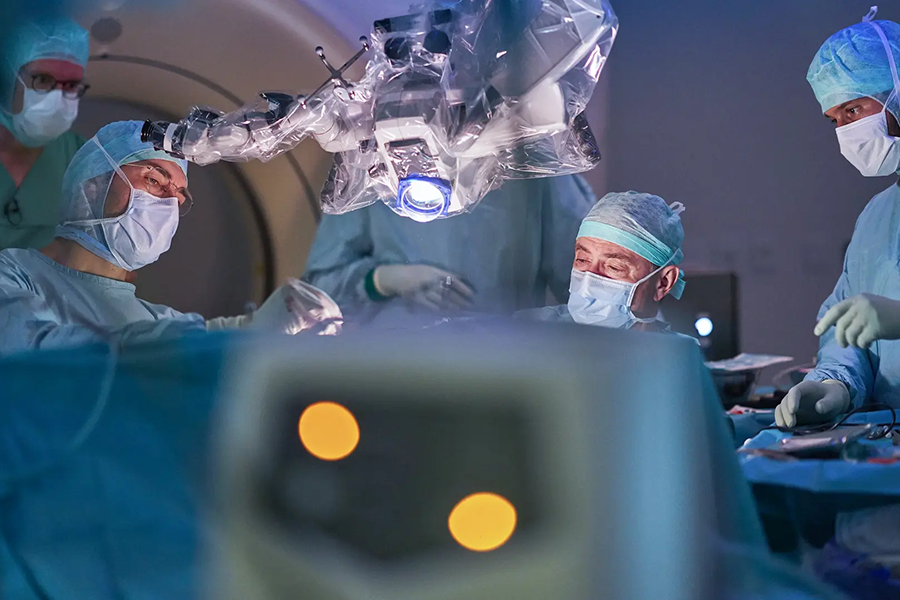Brain-computer interface for a patient with quadriplegia
A team at the Technical University of Munich’s TUM University Hospital has implanted a brain-computer interface in a patient paralyzed from the neck down. The five-hour procedure was the first of its kind performed in Europe. The device enables research that could one day help restore independence and improve quality of life for patients. In particular, the scientists hope to enable the 25-year-old patient to control his smartphone and a robotic arm using only his thoughts.

In a five-hour operation, a team from the Department of Neurosurgery at TUM University Hospital implanted a brain-computer interface in a 25-year-old man. Photo: Julia Bergmeister / TUM Klinikum
Bernstein member involved: Simon Jacob
“I hope I’ll be able to eat and drink independently again and need a little less help in everyday life,” says Michael Mehringer. At 16, he survived a serious motorcycle accident. This was followed by 14 months in hospital, including a coma, intensive care, and numerous surgeries. To this day, he is quadriplegic. Michael Mehringer and his family learned about the study “Artificial Intelligence for Neuro Deficits” at TUM University Hospital through a newspaper article. “I always stay positive. I’m always hopeful. That’s what keeps me going. I’m proud I can contribute to advancing research,“ he says.
Surgery lasted more than five hours
After extensive preparation and planning, the neurosurgery team at TUM University Hospital implanted a custom-made brain-computer interface in a surgery lasting more than five hours. The device’s 256 microelectrodes capture signals from the part of the brain that plans and executes complex grasping movements.
“The greatest challenge was to implant the electrodes with absolute precision. That’s the only way to obtain accurate recordings and measure brain signals reliably,” explains Professor Bernhard Meyer, Director of the Department of Neurosurgery.
First operation of its kind in Europe
“With this procedure, a brain-computer interface was implanted for the first time in Europe in a patient with quadriplegia,” says Simon Jacob, Professor of Translational Neurotechnology. “We are proud to be the first academic institution in Europe to have implanted two such devices.” In 2022, the team implanted one in a stroke patient with a language disorder, which made it possible to map language processing in the healthy right hemisphere of her brain.
Decoding brain signals
With the surgery complete, now the research phase has begun. Michael Mehringer and the researchers meet in the lab twice a week. A computer is connected to the implant via a port. The system extracts neuronal activity from the transmitted signals. These data are then used to train AI algorithms to associate specific patterns of brain activity with the movements Michael Mehringer intends to make. This is where the team from the Munich Institute of Robotics and Machine Intelligence (MIRMI) at TUM comes in.
The first step is to use the decoded brain signal to control a cursor on a screen or a mouse click. Next, step by step, Michael Mehringer will hopefully learn to control a robotic arm for grasping objects. “Rather than expecting humans to conform to and learn how to operate robotic systems, the focus is on designing systems that recognize human intent,” says team leader Dr Melissa Zavaglia. After a couple of weeks of training, the team has achieved its first breakthrough: As Michael Mehringer attempts to follow a cursor moving across a monitor, the researchers can tell from his brain signals where he is intending to move to.
Competing with US research centers
In developing new solutions for people with severe physical disabilities, the Munich researchers see themselves in direct competition with institutions in the United States. According to Simon Jacob, in the US, there has been major investment in brain-computer interface research over the past 20 years. “Our goal is to close the gap between Europe and the US by taking on projects that aren’t possible anywhere else. That requires bringing together all the key disciplines in one place: medicine, neuroscience – including AI – and engineering. Worldwide, very few universities combine these three disciplines as effectively as the Technical University of Munich,” Professor Jacob says.
Call for volunteers
With the help from committed participants like Mehringer, the Munich researchers hope to achieve major breakthroughs in the coming years. They are currently seeking young adults from the Munich area with high-level spinal cord injuries – for example caused by diving or traffic accidents – to join the study.
“We’re looking for people with a pioneering spirit and a positive outlook on life,” says Simon Jacob. “However, it’s important for participants to understand that this is research, not treatment. The outcome of research is not as predictable as, for example, taking a painkiller that has been refined and tested for decades.”




